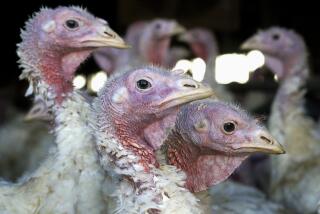Turkey-tryptophan myth, 6 others get a good debunking
- Share via
Eating turkey makes you sleepy. It’s the bird’s tryptophan, an amino acid, that makes you want to take a nap. Right?
Wrong, say Drs. Rachel Vreeman, research fellow, and Aaron Carroll, director of the Center for Health Policy and Professionalism, both at Indiana University School of Medicine. They examined that and six other commonly held beliefs in the Dec. 21 British Medical Journal. They found that turkey, chicken and ground beef each contain about the same amount of tryptophan per ounce, and pork and Swiss cheese actually contain higher levels. Any large meal slows blood flow and oxygenation to the brain, inducing sleepiness, they found.
They gathered a list of medical beliefs held by their fellow physicians, then subjected seven of them, including the drowsiness-inducing properties of turkey, to scientific review.
Also false or unproven:
* People should drink at least eight glasses of water per day. (Adequate fluid intake is usually met through juice, milk, caffeinated beverages and fruits and vegetables.)
* We use only 10% of our brains. (Brain imaging studies show that no area of the brain is completely silent or inactive.)
* Hair and fingernails grow after death. (Dehydration after death can cause the skin around hair and nails to retract, creating the appearance of increased length.)
* Shaving makes hair grow back darker and coarser. (The stubble only appears coarser before it tapers, and darker before sun and chemicals lighten it.)
* Reading in dim light ruins eyesight. (It may cause temporary eye strain, but no permanent damage.)
* Cellphones interfere with functioning of hospital equipment. (A study in the October 2005 journal Mayo Clinic Proceedings found that, in more than 500 tests involving 16 medical devices and six cellphones, the rate of clinically relevant interference was 1.2%. Use of newer cellphones may result in even less interference. Mayo researchers repeated the study, published in the March 2007 issue of the journal, and found no interference of any kind.)
“Unless you know why something is true,” says Carroll, “you should question everything.”
--




